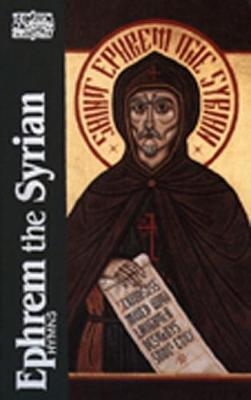Ephrem the Syrian: Hymns

Ephrem the Syrian: Hymns
...a milestone in American religious publishing. New Catholic World Ephrem the Syrian: Hymns translated and introduced by Kathleen E. McVey preface by John Meyendorff Blessed be the Child who today delights Bethlehem. Blessed be the Newborn Who today made the humanity young again. Blessed be the Fruit Who Bowed Himself down for our hunger. Blessed be the Gracious One Who suddenly enriched all of our poverty and filled our need. Ephrem the Syrian (c.306-373) Ephrem was born in the Mesopotamian city of Nisibis toward the end of the third century. An outpost of the Roman Empire, Nisibis and its Christian citizens were to be formed by the reign of Constantine and by the doctrines of the Council of Nicea. There, in the context of a large and sophisticated Jewish population and numerous Gnostic sects, Ephrem sought to defend orthodox Nicene Christianity. His teaching and writing made him an influential voice in the life of Syriac Christianity through the peaceful years of Constantine's patronage, the years of persecution after 361 under Emperor Julian, and the conflict between Persians and Romans which ultimately forced Ephrem to move to Edessa where he stayed until his death in 373. It was as a poet that Ephrem made his greatest impact. Writing in isosyllabic verses called madrashe, he attained a literary brilliance that won him a place of prominence not only in his own tradition, but also in the Coptic, Ethiopian, Armenian, and Arabic traditions as well. His hymns, praised in the West by Jerome, had a formative influence on the development of medieval religious drama in Europe. Blending Greek forms with his native style, he wove a highly crafted poetry of rich symbolism, attempting to fit the events of his day into a cosmic framework of God's redemptive act in Christ. Ephrem's combination of elements of Stoicism and Middle Platonism with Christian belief in a form reminiscent of the great second century apologists produced a corpus that speaks of his own literary genius and even more eloquently of the majesty and beauty of the divine source of all true poetry. Here, in a fresh and lively translation, are the Hymns on the Nativity, Hymns Against Julian, and the Hymns on Virginity and the Symbols of the Lord in which that voice may be heard closely and appreciated, wondered at, and enjoyed. +
"...a milestone in American religious publishing." New Catholic World Ephrem the Syrian: Hymns translated and introduced by Kathleen E. McVey preface by John Meyendo
PRP: 247.69 Lei
Acesta este Prețul Recomandat de Producător. Prețul de vânzare al produsului este afișat mai jos.
222.92Lei
222.92Lei
247.69 LeiLivrare in 2-4 saptamani
Descrierea produsului
...a milestone in American religious publishing. New Catholic World Ephrem the Syrian: Hymns translated and introduced by Kathleen E. McVey preface by John Meyendorff Blessed be the Child who today delights Bethlehem. Blessed be the Newborn Who today made the humanity young again. Blessed be the Fruit Who Bowed Himself down for our hunger. Blessed be the Gracious One Who suddenly enriched all of our poverty and filled our need. Ephrem the Syrian (c.306-373) Ephrem was born in the Mesopotamian city of Nisibis toward the end of the third century. An outpost of the Roman Empire, Nisibis and its Christian citizens were to be formed by the reign of Constantine and by the doctrines of the Council of Nicea. There, in the context of a large and sophisticated Jewish population and numerous Gnostic sects, Ephrem sought to defend orthodox Nicene Christianity. His teaching and writing made him an influential voice in the life of Syriac Christianity through the peaceful years of Constantine's patronage, the years of persecution after 361 under Emperor Julian, and the conflict between Persians and Romans which ultimately forced Ephrem to move to Edessa where he stayed until his death in 373. It was as a poet that Ephrem made his greatest impact. Writing in isosyllabic verses called madrashe, he attained a literary brilliance that won him a place of prominence not only in his own tradition, but also in the Coptic, Ethiopian, Armenian, and Arabic traditions as well. His hymns, praised in the West by Jerome, had a formative influence on the development of medieval religious drama in Europe. Blending Greek forms with his native style, he wove a highly crafted poetry of rich symbolism, attempting to fit the events of his day into a cosmic framework of God's redemptive act in Christ. Ephrem's combination of elements of Stoicism and Middle Platonism with Christian belief in a form reminiscent of the great second century apologists produced a corpus that speaks of his own literary genius and even more eloquently of the majesty and beauty of the divine source of all true poetry. Here, in a fresh and lively translation, are the Hymns on the Nativity, Hymns Against Julian, and the Hymns on Virginity and the Symbols of the Lord in which that voice may be heard closely and appreciated, wondered at, and enjoyed. +
"...a milestone in American religious publishing." New Catholic World Ephrem the Syrian: Hymns translated and introduced by Kathleen E. McVey preface by John Meyendo
Detaliile produsului













